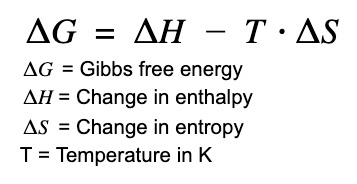
| Enthalpy | Entropy | Gibbs Free Energy |
| |
|
|
| Enthalpy is the amount of heat energy transferred (heat absorbed or emitted) in a chemical process under constant pressure. | Entropy measures the amount of heat dispersed or transferred during a chemical process. | Gibbs Energy is also known as energy available to initiate a chemical process and is determined under constant pressure and temperature. |
| It is expressed as a change in enthalpy (ΔH) because the total enthalpy (H) of a system cannot be measured directly. | Entropy can be thought of as the degree to which energy is dispersed throughout a system. For example, water has a greater entropy than ice because energy is more spread out in water than in ice. | Some reactions are spontaneous (eg. rusting). A spontaneous process happens by itself without any energy added to the system (apart from the activation energy to start the process).
A non-spontaneous process will not take place unless it is continuously driven by an external source of energy.
|


well explained , thanks for the information.